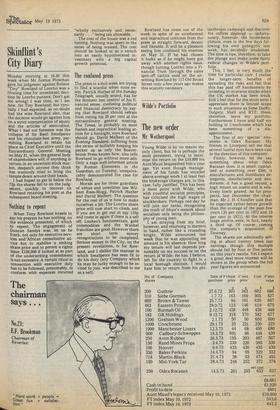Skinflint's City Diary
Monday morning at 10.30 this week when Mr Justice Plowman gave his judgment against Roland "Tiny" Rowland of Lonrho was a riveting time for investment decision by Lonrho punters. Don't get me wrong! I was then, as I am now, for Tiny Rowland; but cynically I had expected, as no doubt had the wise Rowland also, that the decision would go against him on a strict interpretation of equity and the articles of association. What I had not foreseen was the collapse of Sir Basil Smallpeice and his chocolate-box army, permitting Rowland to retain his place as Chief Executive until the Extraordinary General Meeting on May 31, when the general body of shareholders will, if anything is certain in an uncertain stock market, despatch anyone they think has wantonly tried to bring the temple down around their heads. I had hoped to get in below the '72p the shares fell to on the judgement, quickly to recover on Rowland retaining his post at the subsequent board meeting.
Nothing to repent
When Tony Rowland kneels to say his prayers he has nothing, on the evidence presented, of which to repent. The engagement of Duncan Sandys was, let us be frank, not only for executive services and 'African consultative advice but to stabilise a sinking share price and to permit a rights Issue. £130,000 if looked at as part of the underwriting commitment is not excessive. A certain ritual in connection with executive duty has to be followed, presumably, to conform with expenses incurred "wholly exclusively and necessarily . . ." being tax allowable.
The cost of the house was a red herring. Nothing was spent in the sense of being wasted. The cost should be looked at as a switch into an easily hypothecated investment with a big capital growth potential.
The confused press
The press in a dull week are trying to find a scandal when none exists. Patrick Hutber of the Sunday Telegraph, usually sound, has for the moment lost control of his financial sense, confusing political and financial democracy by saying that Rowland should refrain from voting his 20 per cent at the extraordinary general meeting. The Times, in probably its most foolish and impractical leading article for a fortnight, says Rowland should go. David Malbert of the Evening Standard, suffering from the strain of bullishly keeping his pecker up as only the Beaverbrook Press knows how, also tells Rowland to go without more ado. Only a sage well-informed article by Roman Eisenstein in the Guardian, on Tuesday, unequivacably demonstrated the case for Rowland.
Morals are for those guardians of virtue and unwritten law William Rees-Mogg, Patrick Hutber and David Malbert. The question for the rest of us is how to make ourselves a bit. The Lonrho share price will now start to climb, and if you are in get out at say 110p and come in again if there is a sell off, Lonhro's fundamentals, gold commodities and the Wankel franchise are good. However there are short term money renegotiations to be completed. Serious money in the City, on the present revelations, is for Row land, and I dislike the manner in which Smallpeice has seen fit to do his duty (any Company which he may be lucky enough to be invited to join, was described to me as a sell). Rowland has come out of the week in spite of an uninformed and impractical criticism from the press as straight forward, decent and likeable. It will be a pleasure seeing him confound his enemies on May 31. If he had chosen it looks as if he might have got away with another rights issue, though turning Lonrho into a Financial Trust through the same spin-off tactics used on the unwitting Rowland by 117 Old Broad Street only a few years ago makes this scarcely necessary.


































 Previous page
Previous page